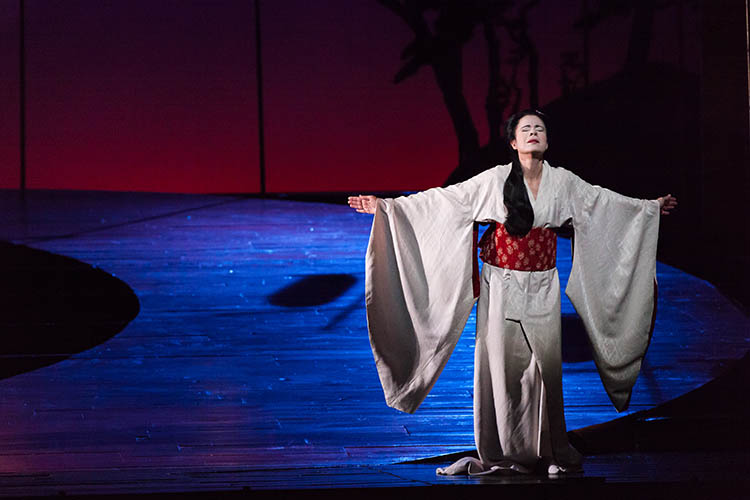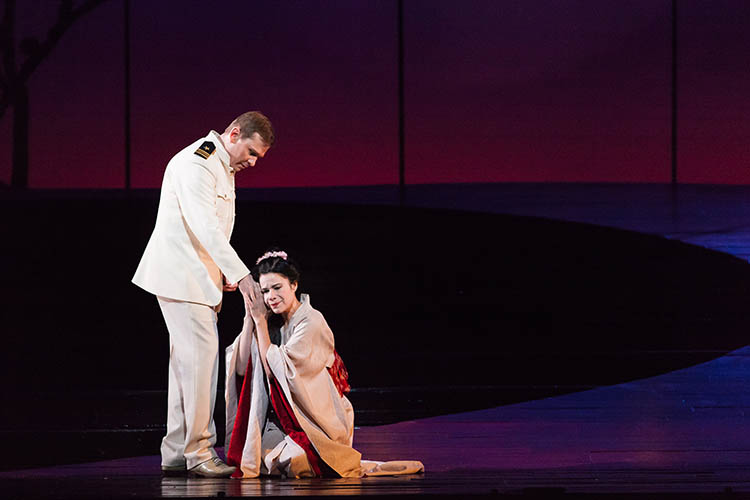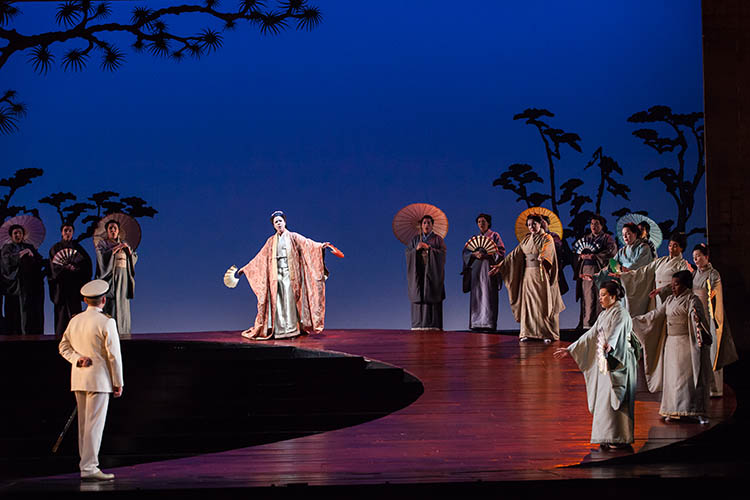January 14, 2020
True to herself: Cio-Cio-San speaks
The geisha Cio-Cio-San – also known as "Madama Butterfly" in Puccini's opera – marries U. S. Navy Lieutenant B. F. Pinkerton. He soon leaves for home in America. Cio-Cio-San gives birth to their child and, with her faithful maid Suzuki, confidently awaits his return to her in Japan. Three years later he does return, but only to take the child back with him. She yields to his demands, but in doing so, she chooses to end her own life.
Ana María Martínez, widely recognized around the globe for her portrayal of Cio-Cio-San, illustrates for us her profound commitment to this character and how one presents this role in today's world. Below, she considers Cio-Cio-San's origins and early hardships with a keen understanding of how both the character's experiences and her culture shape the actions and choices we see onstage.

Ana María Martínez as Cio-Cio-San in Houston Grand Opera's production of Madama Butterfly (Photo: Lynn Lane)
I imagine that Cio-Cio-San's parents thought they had no choice but to give her up to a geisha house. Is that life abusive? Not intentionally, but is it traumatic? Likely, due in great part to the abrupt transition when the girls, separated from their families, first arrived. It's not as if the young women are welcomed with hugs and kisses. It's "Scrub the floor, do this, do that" – discipline from the get-go. These young women learn survival mechanisms. But what do you do with that? If you've suffered abuse, traumatic experiences, the more interesting question is how do you survive it? How do you keep hope in your life?
When Cio-Cio-San reads the inscription on her father's dagger before she commits suicide – the dagger he used to kill himself – it says, "He who cannot live with honor must die with honor." She lives within a corrupt system, but she just accepts it as it is. In her situation, you can't waver; if she allows herself to doubt, the doubts will become reality. Suzuki wants to slap some sense into her, and her suitor Yamadori tries to make her see it – why else would he promise her wealth and shower her with gifts? Because he, too, knows Pinkerton isn't coming back. Cio-Co-San will not see it. She has blinders on and is extremely stubborn, which I believe is part of her survival mode.
Cio-Cio-San ultimately takes control of her life, within what was most noble in her culture. Her father was a samurai; her inner samurai kicks in and she says, "No, I'm not going down the way they say – I'm going to do it my way." She disrespects Yamadori in front of other people, yet no one does anything to her. Everyone respects her as a young woman of substance. I've never, ever seen her as a victim. Actually, she's quite empowering.
I've never, ever seen her as a victim. Actually, she's quite empowering.
What Cio-Cio-San goes through is heartbreaking, but she's not forced into it. In Japan, at that time, the law was if you'd been abandoned, it was equivalent to divorce. The marriage-broker Goro says to her, "Snap out of it and choose something else." But what are her options? It's not as if she had family to go to; when she changed her religious faith to respect and honor Pinkerton, they banished her for it. So she made her choice, which was quite independent for the time. She's one of the strongest women I've ever come across in vocal literature and in storytelling.

(Photo: Lynn Lane/Houston Grand Opera)
TACKLING TODAY'S MADAMA BUTTERFLY
Today, #MeToo can be the brilliant lens with a focus on an individual's empowerment through their inner strength and honest core. We all want to feel accurately seen and to be treated with respect. My father told me when I was nine years old, "The most important thing you can obtain in your life is a good education. Also, never be with a partner simply because you need them to take care of you. You have to take care of yourself." And he added, "Never ever, ever take nonsense from anyone, even a parent." He educated me, his only child, to be fiercely independent.
Individuals who are pro-equal rights for women might see Madama Butterfly and be appalled, but in context we see that Cio-Cio-San repeatedly makes choices that are true to her. She's not listening to anyone else's idea of what she should and shouldn't do, and she's not saying, "Woe is me." We have to keep this in perspective – it isn't happening in 2020 Japan! But there are cultures beyond Japan where women are suffering, and they think they have no choice. That's a different reality.
There are people who feel strongly that the woman interpreting Cio-Cio-San onstage should be of Asian descent, of an Asian culture. But I believe we should tap into Madama Butterfly as a story of anyone who could possibly be going through this experience of falling in love, of giving of oneself. This is one of the epitomes of loyalty – never-faltering devotion – not just to her husband, but to her child. It then becomes everyone's story.
I believe we should tap into Madama Butterfly as a story of anyone who could possibly be going through this experience of falling in love, of giving of oneself.
In creating authenticity, a role's interpreter is a canvas onto which the audience can project what they want and need to see. That's always been my focus whenever I portray a character. With Cio-Cio-San I have the costume through the kimono, the wig and makeup, and it's done very tastefully in using all of that art in a way that helps to tell a story, always respecting the culture, never exaggerating.
The first time I sang Cio-Cio-San, premiering Michael Grandage's production in Houston, I worked with a Japanese woman who was well-versed in the tea ceremony. She also showed me how to walk, how to kneel, which line of the tatami mats I have to spot before I kneel and get up, how I place my hands, how extended are my elbows (if it's too far, that's a man's position). All of this is a deep part of the Japanese culture, which for the audience will help to further set the location and the origin of this woman in front of them as Japanese.

(Photo: Lynn Lane/Houston Grand Opera)
I want to show interest and empathy for the mentality of a woman at the time of this story. Just because I'm not Japanese doesn't mean I don't understand – I deeply care to understand. This helps me to feel closer to Cio-Cio-San and her culture.
The ultimate authenticity comes in being honest with your emotions. This is every woman's story, but potentially it's every human's story. Hopefully we won't go through something this traumatic ourselves, but we all know some degree of it – it doesn't belong to only one culture. However, we have to set it somewhere and then maintain honesty in telling the story, which is paramount. If it's a specific era or a place, you try to be as genuine as you can with your body language. I want to show the elegant restraint associated with the beauty of the Japanese culture, with the juxtaposition of the soaring Puccini lines. In the music, you hear all that's going on inside of Cio-Cio-San.
The ultimate authenticity comes in being honest with your emotions. This is every woman's story, but potentially it's every human's story.
I love giving Italianate expressiveness and passion through phrasing to this character. Even if it's a culture that doesn't outwardly express itself the way in which an Italian would, that doesn't mean that in this case Cio-Cio-San doesn't have that deep degree of passion inside. There are several cultures where, given their body language, you wouldn't necessarily assume they have this almost hurricane of passion going on inside, but they do.
I want this opera to remind the audience to be independent human beings and respect people's choices, even if it's hard to understand them. Respect that they have to be true to themselves and follow their own paths. Learn what it means to tolerate a different culture and a different mentality from your own, because through that respect and that tolerance, we will listen to each other better. We will be able to discuss our feelings, dreams, hopes, needs, concerns. We have many more similarities than we do differences, and that's what I aim to show.
We have many more similarities than we do differences, and that's what I aim to show.
Faith and loyalty are universal. So is heartbreak, when you realize you're not in their heart the way they are and will always be in yours. For Cio-Cio-San, there's no reason to live anymore, except for her child. She would have gotten over the loss of Pinkerton, but not the loss of her child. Once she realizes that the man, within his rights at that time, will take from her the greatest blessing she's ever had, the greatest love of her life – her child – it's done for her. When she decides to end her life on her own terms, some people might argue, how could she do that to the child? But she even says in her farewell aria, "You won't have to worry about me. You'll be far away, you'll cross the ocean – you won't be burdened by me. I'm breaking the tie so you can be free." In her mind, that is the best and noblest thing to do.
Puccini's Madama Butterfly is onstage February 6-March 8. Conductor Henrik Nánási leads Ana María Martínez (Cio-Cio-San, Feb 6-29 & Mar 5 & 8), Lianna Haroutounian (Cio-Cio-San, Mar 4 & 7), Brian Jagde (Pinkerton, Feb 6-29 & Mar 5 & 8), Brandon Jovanovich (Pinkerton, Mar 4 & 7), Deborah Nansteel (Suzuki) and Ryan Opera Center alums Anthony Clark Evans (Sharpless) and Rodell Rosel (Goro). Click here for tickets and additional information.
